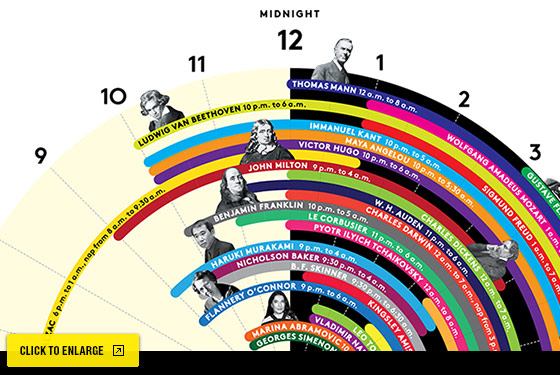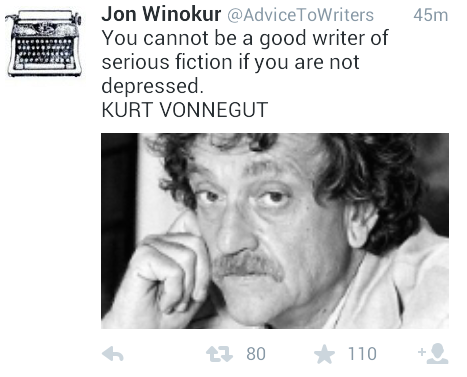“Brilliance, it seems, is the product of a well-rested mind, not artistic all-nighters.”
I’ve been thinking about the conflation of mental illness and genius. The generally accepted thesis seems to be, the more fucked up you are, the better your creative work will be. I used to believe that. Now I think it’s bullshit.
This is one of the many things I got to discuss with my friend Jem while in Wellington last week. She’s the first person who has really challenged this belief in me.
When I look over my writing career so far, the times I am most prolific do often coincide with the times when I’ve been very unwell. But it’s not good work. It’s angsty and self-indulgent and dark and most of it I never want to look at again.
I think people with mental health challenges are often very sensitive and empathetic, and they go to dark places. They know vulnerability, they know heartache, they know pain. Of course this feeds into their creative work.
But the real power comes from harnessing that, not giving in to it.
I found this graphic pretty interesting:
Image By Jason Feifer
It’s too easy to romanticise pain. To glorify “artsy all nighters” that are actually incredibly unhealthy. Look at all these dudes (way too many dudes). Early to bed, early to rise, nearly all of ’em. And geniuses, all ‘of em.
My favourite contemporary writers all talk about the importance of discipline and routine. There’s a couple of tortured souls in there, sure, but many of them are people who work 9-5 (or much more) and write in set hours every day and produce incredible stuff.
This sort of thing is a trap:
I know you’re brilliant, Mr Vonnegut, but I call bullshit.
‘Advice to writers’? No. Good advice to writers would be: eat well. Sleep well. Take whatever medication you need to. Exercise. Get a writing routine and stick to it. Lead as full a life as possible.
The “tortured soul” stuff is seductive but it’s not sustainable. You do not need to go into the pit to write about it. In fact, there’s no lights down there so you’re just making it that much harder on yourself.
Writers are already in the top ten professions in which people are most likely to be depressed, so it’s not surprising the correlation happens and is encouraged. Not to mention the image we have of the greats, impoverished and mad, feverishly at their typewriters. Beautifully emaciated. Writing by candlelight at 3am. Producing incredible legends that live on long after they’ve hung themselves on their diet of darkness and dishonesty.
Maybe that happened. But it wouldn’t have been every night. And to be honest, early death and posthumous glorification isn’t something I aspire to. Well, not the first bit anyway. Once I’m gone I would definitely like parades in my name, thanks.
In the meantime, I’m going to continue writing for two hours every day that I am well enough, sleeping in, and eating biscuits.
The epitaph of true greatness.



So true. I also get really sick of people who seem to think having some kind of mental illness makes you more loveable, like it’s a personality quirk. I can’t speak for everyone but it has damaged my relationships with others rather than strengthening them and it makes it much harder for me to be productive than times when I have been more well. There is certainly a place for literature that speaks about depression and other mental illnesses, I myself find Sylvia Plath’s poetry beautiful and relatable but you’re completely right, it isn’t sustainable and it isn’t superior to other works just because it comes from a place of darkness.
Sorry to jump in, but just wanted to say your comment about people thinking it’s a personality quirk and something harmless to the person’s relationships really strikes with me. It’s surprising as to how many people think that and make it a defining point of the person they’re talking about.
I feel like this could be applied to a lot of things, such as the starving artist, the writer or student who drinks just a “bit” to let the words come, or stay up late because that’s the best “study” hour supposedly. However you make an excellent excellent point, in that it’s not healthy. It’s a short term goal for short term gain that’s not always quantifiable.
However, keeping well and keeping a long-term focus on trying developing a life, whether it be sleeping well, exercising, taking a job so you have security and can make your work a hobby, is more healthy and far more quantifiable, which hopefully reflects in the work overall.
You make some excellent points in here. It’s these type of posts that remind me not just how a good writer you are, but why you got a column. You strike the perfect balance always.
Pingback: Writing While Woman: Celebrating Your Wins – Luna Station Quarterly